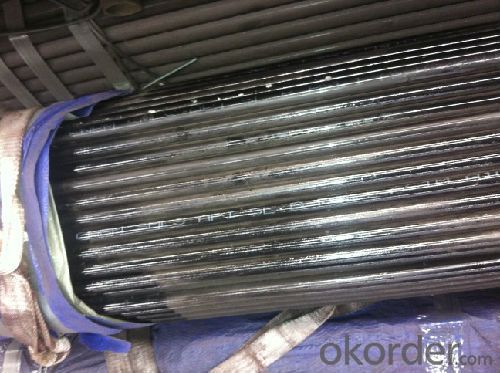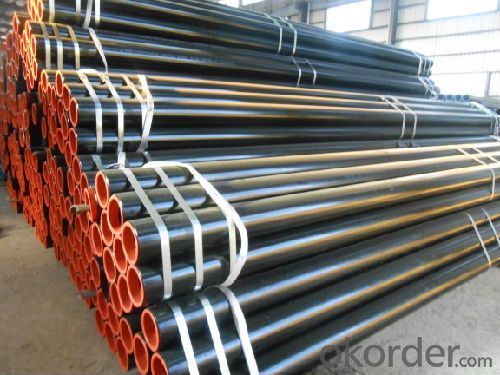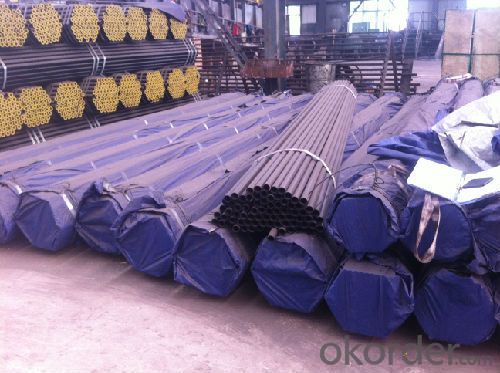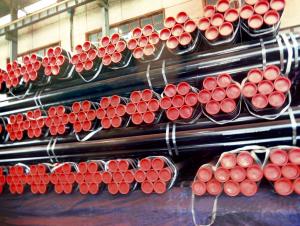Electtic Resistance Welded steel Pipe ERW Oil Pipes Factory
- Loading Port:
- China Main Port
- Payment Terms:
- TT or LC
- Min Order Qty:
- 30 m.t.
- Supply Capability:
- 12000 m.t./month
OKorder Service Pledge
OKorder Financial Service
You Might Also Like
1、Structure of Seamless Pipe ASTM A106/53:
Seamless pipe is formed by drawing a solid billet over a piercing rod to create the hollow shell. As the manufacturing process does not include any welding, seamless pipes are perceived to be stronger and more reliable. Historically seamless pipe was regarded as withstanding pressure better than other types, and was often more easily available than welded pipe.
carbon seamless steel pipes are widely used in gas, water and oil, transpotation;constructions;Bridge,highway,windows of model steel door; building materials;fences;heating facilities Fluid Pipe;conduit pipe,scaffolding pipe.etc.
Payment Terms: L/C D/A D/P T/T
Packing and shipment
Packaged in bundles,as per customers' requirements, it can also bepackagesd as beveled ends, typed marking, black painting, plastic caps protection,woven bags packing
For 20" container the max length is 5.8m; For 40" container the max length is 12m. other options are available based on customer requests. Please discuss when placing orders.
2、Main Features of the Seamless Pipe ASTM A106/53:
• High manufacturing accuracy
• High strength
• Small inertia resistance
• Strong heat dissipation ability
• Good visual effect
• Reasonable price
3、Seamless Pipe ASTM A106/53 Specification:
| Thickness: | 1.5 - 14 mm | Section Shape: | Round | Outer Diameter: | 21 - 219 mm |
Place of Origin: | Tianjin China (Mainland) | Secondary Or Not: | Non-secondary | Application: | Structure Pipe |
| Technique: | Cold Rolled | Certification: | ISO | Surface Treatment: | oiled |
Special Pipe: | EMT Pipe | Alloy Or Not: | Non-alloy | Wall thickness: | thin wall pipe |
| Grade: | Q195,Q195-Q345 | Standard: | BS ,JIS G3101,DIN 2444,BS,JIS,DIN,API 5L |
4、Packaging & Delivery
Packaging Details: | seaworthy package,bundles wrapped with strong steel strip |
Delivery Detail: | 15-30days after received 30%TT |
5、FAQ of Seamless Pipe ASTM A106/53:
①How is the quality of your products?
Our products are manufactured strictly according to national and internaional standard, and we take a test
on every pipe before delivered out. If you want see our quality certifications and all kinds of testing report, please just ask us for it.
Guaranteed: If products’ quality don’t accord to discription as we give or the promise before you place order, we promise 100% refund.
②How about price?
Yes, we are factory and be able to give you lowest price below market one, and we have a policy that “ for saving time and absolutely honest business attitude, we quote as lowest as possible for any customer, and discount can be given according to quantity”,if you like bargain and factory price is not low enough as you think, just don’t waste your time.Please trust the quotation we would give you, it is professional one.
③Why should you chose us?
Chose happens because of quality, then price, We can give you both.Additionally, we can also offer professional products inquiry, products knowledge train(for agents), smooth goods delivery, exellent customer solution proposals.Our service formula: good quality+good price+good service=customer’s trust
SGS test is available, customer inspection before shipping is welcome, third party inspection is no problem.
6、Seamless Pipe ASTM A106/53 Images:



- Q:What are the different pressure ratings for steel pipes?
- Steel pipes have varying pressure ratings to indicate their maximum safe handling pressure. The pressure ratings of steel pipes can differ based on factors like pipe diameter, wall thickness, and material grade. Common pressure ratings for steel pipes are as follows: 1. Schedule 40: This is the standard pressure rating for general applications. It is suitable for low to medium pressure systems, with a maximum working pressure of 150 psi. 2. Schedule 80: Used for higher pressure requirements, it has a thicker wall thickness compared to Schedule 40, enabling it to handle working pressures of up to 300 psi. 3. Schedule 160: This heavy-duty pressure rating is for high-pressure applications. It has an even thicker wall thickness than Schedule 80 and can handle working pressures of up to 500 psi. In addition to these standard pressure ratings, there are specialized steel pipes available with higher pressure ratings, such as Extra Strong (XS) and Double Extra Strong (XXS). These pipes are designed for extremely high-pressure systems and have thicker walls than Schedule 160. It's important to note that the pressure ratings mentioned above specifically apply to steel pipes. Pressure ratings may vary for pipes made from other materials, such as copper or PVC. When selecting a steel pipe, it is crucial to consider the required pressure rating based on the specific application and system requirements to ensure safe and efficient operation.
- Q:How are steel pipes used in the manufacturing of marine applications?
- Steel pipes are commonly used in the manufacturing of marine applications due to their durability, strength, and resistance to corrosion. They play a crucial role in various applications such as shipbuilding, offshore platforms, and underwater pipelines. Steel pipes are used to transport fluids, gases, and oils, as well as for structural support and protection against harsh marine environments. Additionally, steel pipes are also utilized in the construction of marine heat exchangers and cooling systems.
- Q:What is the primary purpose of steel pipes?
- The primary purpose of steel pipes is to transport fluids and gases, such as water, oil, and natural gas, over long distances efficiently and safely. They are commonly used in various industries including construction, oil and gas, and infrastructure development.
- Q:How are steel pipes used in the construction of highways?
- Steel pipes are commonly used in the construction of highways for various purposes, such as drainage systems, culverts, and sign supports. They provide a durable and efficient solution for transporting stormwater and preventing damage to the road surface. Additionally, steel pipes are utilized to support highway signs and traffic signals, ensuring their stability and longevity.
- Q:How are steel pipes used in the chemical industry?
- Steel pipes are commonly used in the chemical industry for various applications including the transportation of corrosive chemicals, as well as for transferring fluids and gases at high temperatures and pressures. These pipes are durable, resistant to corrosion, and can withstand harsh working conditions, making them ideal for handling chemicals in industrial settings.
- Q:Can steel pipes be used for hydronic heating systems?
- Yes, steel pipes can be used for hydronic heating systems. Steel pipes are commonly used in hydronic heating systems due to their durability, strength, and ability to withstand high temperatures and pressure. They are also resistant to corrosion, which is important for maintaining the efficiency and longevity of the heating system. However, it is essential to ensure proper insulation and protection against potential expansion and contraction issues that steel pipes may face when exposed to high temperatures.
- Q:How are steel pipes used in the manufacturing of boilers?
- Steel pipes are an integral component in the manufacturing of boilers due to their strength, durability, and heat-resistant properties. Boilers are used to generate steam or heat water for various industrial and commercial applications. Steel pipes are primarily used in the construction of boiler tubes, which serve as the main heat transfer medium. These tubes are subjected to high temperatures and pressure, making it crucial to use a material that can withstand these extreme conditions. Steel, with its excellent mechanical properties and resistance to corrosion, is the ideal material for this purpose. The manufacturing process of boilers involves forming the steel pipes into specific shapes and sizes to create the boiler tubes. These tubes are then connected to form a network of channels through which hot gases or water flow. The steel pipes used in this process are often seamless or welded, depending on the requirements of the boiler design. The steel pipes used in boilers must meet stringent quality standards to ensure the safety and efficiency of the system. They are tested for their ability to withstand high pressure, temperature, and corrosion. Additionally, they undergo various inspections and tests, such as ultrasonic testing and radiographic examination, to detect any defects or flaws that could compromise the boiler's performance. In summary, steel pipes play a crucial role in the manufacturing of boilers by serving as the primary material for boiler tubes. Their strength, durability, and heat-resistant properties make them suitable for withstanding high temperatures and pressure. These pipes undergo rigorous testing to ensure their quality and reliability in creating efficient and safe boiler systems.
- Q:Can steel pipes be used for oil transportation?
- Yes, steel pipes can be used for oil transportation. Steel pipes are commonly used in the oil and gas industry for the transportation of crude oil, petroleum products, and natural gas. They are preferred due to their strength, durability, and resistance to corrosion. Steel pipes are capable of withstanding high-pressure environments and can be used for both onshore and offshore oil transportation. Additionally, steel pipes can be welded together to form long pipelines, making them a cost-effective solution for transporting oil over long distances. Overall, steel pipes are a reliable and efficient choice for oil transportation.
- Q:How are steel pipes used in the construction of airports?
- Steel pipes are commonly used in the construction of airports for various purposes such as drainage systems, water supply lines, fuel pipelines, and structural supports. They provide durability, strength, and corrosion resistance, ensuring the efficient operation and safety of airport infrastructure.
- Q:What are the different types of threading on steel pipes?
- There are several types of threading commonly used on steel pipes, including tapered or NPT (National Pipe Taper), straight or NPS (National Pipe Straight), and British Standard Pipe (BSP) threading. These different types of threading are designed to ensure a secure and leak-free connection between pipes and fittings.
1. Manufacturer Overview |
|
|---|---|
| Location | |
| Year Established | |
| Annual Output Value | |
| Main Markets | |
| Company Certifications | |
2. Manufacturer Certificates |
|
|---|---|
| a) Certification Name | |
| Range | |
| Reference | |
| Validity Period | |
3. Manufacturer Capability |
|
|---|---|
| a)Trade Capacity | |
| Nearest Port | |
| Export Percentage | |
| No.of Employees in Trade Department | |
| Language Spoken: | |
| b)Factory Information | |
| Factory Size: | |
| No. of Production Lines | |
| Contract Manufacturing | |
| Product Price Range | |
Send your message to us
Electtic Resistance Welded steel Pipe ERW Oil Pipes Factory
- Loading Port:
- China Main Port
- Payment Terms:
- TT or LC
- Min Order Qty:
- 30 m.t.
- Supply Capability:
- 12000 m.t./month
OKorder Service Pledge
OKorder Financial Service
Similar products
New products
Hot products
Related keywords





























